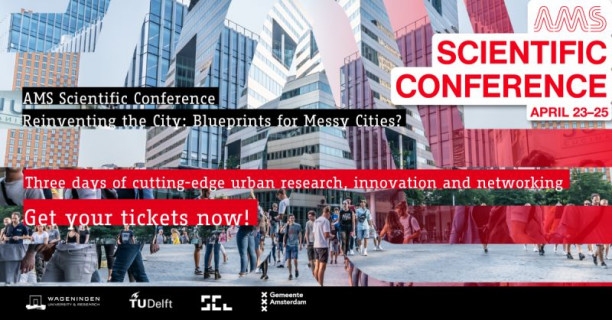Do you want to learn from and network with the best researchers and scientists working to tackle pressing urban challenges?
AMS Institute, is organizing the AMS Scientific Conference from April 23-25 at the Marineterrein, Amsterdam, to address pressing urban challenges. The event is organized in collaboration with the City of Amsterdam.
The conference brings together leading institutions in urban research and innovation, thought leaders, municipalities, researchers, and practitioners to explore innovative solutions for sustainable development in Amsterdam and other global cities.
Keynotes, research workshops, learning tracks, and special sessions will explore the latest papers in the fields of mobility, circularity, energy transition, climate adaptation, urban food systems, digitization, diversity, inclusion, living labs experimentation, and transdisciplinary research.
Attendees can expect to gain valuable insights into cutting-edge research and engage in meaningful discussions with leading experts in their field. You can see the full program and all available sessions here.
This year's theme is 'Blueprints for messy cities? Navigating the interplay of order and messiness'.
The program
Day 1: The good, the bad, and the ugly
Keynotes by Paul Behrens of Leiden University and Elin Andersdotter Fabre of UN-Habitat will be followed by a city panel including climate activist <strong>Hannah Prins</strong>. The first day concludes with a dinner at the Koepelkerk in Amsterdam: you're welcome to join our three-course meal with a 50 euro ticket.
Day 2️: Amazing discoveries
Keynotes by Carlo Ratti of MIT and Sacha Stolp of the Municipality of Amsterdam discuss innovation and research in cities. <strong>Corinne Vigreux</strong>, co-founder of TomTom, and Erik Versnel from Rabobank will participate in the city panel.
Day 3️: We are the city
Keynotes by Paul Chatterton of Leeds University and Victor Neequaye Kotey Deputy Director of the Waste Management Department of the Accra Metropolitan Assembly, Ghana. They discuss how we shape the future of our cities together. This will be followed by a city panel including Ria Braaf-Fränkel of WomenMakeTheCity and prof. dr. Aleid Brouwer of the Rijksuniversiteit Groningen.
To buy tickets: You can secure your conference tickets through our website.
Dinner tickets: On April 23 we’re hosting a dinner at the Koepelkerk in Amsterdam. Tickets for this can be added to your conference pass or bought separately.
Join AMS Institute's Scientific Conference, hosted by TU Delft, Wageningen University & Research, MIT and the City of Amsterdam.





